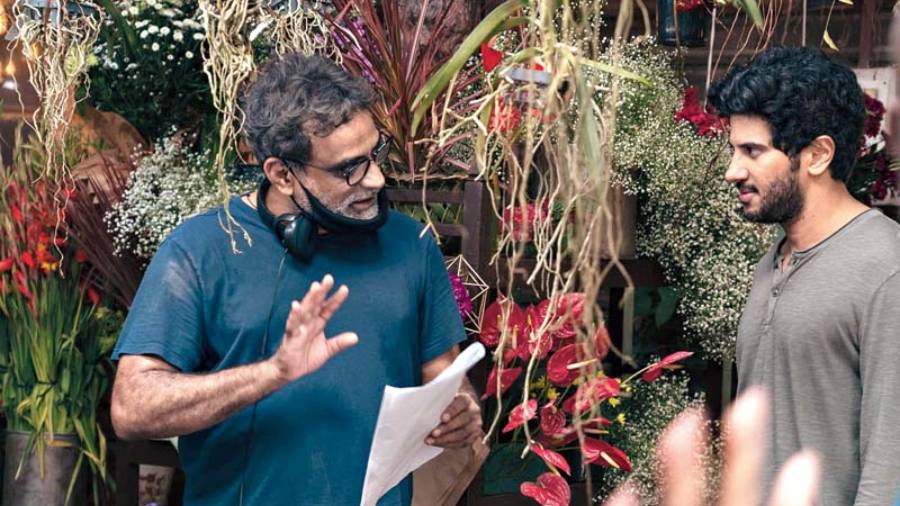It’s a film that you may or may not like, but one that you definitely cannot ignore.
R. Balki’s Chup — that shows film critics being hunted down by a serial killer — is a thriller which examines the fallout of harsh and agenda-based criticism. The Telegraph was present at the special screening of the film in Mumbai. Post that, we caught up with Balki — the man behind novel concepts like Cheeni Kum, Paa and Ki & Ka — for a post-mortem chat on Chup that’s now playing in theatres.
Even at the cost of bringing up critics, what’s the best thing you have heard about the film?
On the review board outside the screening that you also attended, someone wrote, ‘23rd (September, when the film released) ko main wapas aa raha hoon!’ Quite a lovely thing to write... and so simple.
A very senior critic who is also a friend came up to me and said, ‘I didn’t enjoy the film Balki!’ I told him, ‘I didn’t expect you to... I am not surprised at all’. He seemed very personally hurt, and I didn’t have any idea what brought that on. But I understand that sentiment. Some people have definitely felt attacked by the film. But these are the same people who attack other peoples’ work every day!
Despite the advent of influencers and self-styled YouTube critics, bonafide film critics are a very niche demographic. Even five years ago, do you feel a film like Chup would have resonated with a larger audience?
To be honest, I actually had this idea in 2007, right after making my first film Cheeni Kum. I had no idea of the demographic and whether the larger society would really connect with this theme. I approached it from a simple point of view — you can criticise me and my work but I can’t criticise you. How does that work? And why should that work?!
So I had this idea for a long time and I don’t even know whether now is a good time to tell this story. The idea with Chup has been to tell a story that I strongly believe in. The idea hasn’t been to make a blockbuster, though the economics of film-making are also very important. This film has recovered its cost and I am happy about that.

R. Balki with Dulquer on the sets of Chup
This idea has been marinating in your head since your first film. Was there an incident or a review that triggered it?
After I made Cheeni Kum, I thought I had made a very good film. It was my first film... I was not acquainted with many from the industry and I didn’t know critics at all. One of the prominent reviewers of that time trashed Cheeni Kum very badly, with scant regard to the effort that had been made to tell a novel story. I actually went into deep depression. Before this, I had never read anything so nasty. I got very disturbed even though a lot of people loved it and today it’s considered a cult film of sorts.
The success of a film never makes up for the first hurt that you feel as a film-maker. And that review was the first thing I read about my first film. That stayed with me, but thank God I didn’t become a psychopath!
That Cheeni Kum and my films that came after were successful gave me the licence to make more films, but I must tell you the hurt never goes away. A lot of people told me that certain critics — including that particular one — work with a certain agenda, but somehow all this talk never consoled me. I have always found it fascinating that if I am accountable to the audience to deliver a good film, who are critics accountable to?
Film-making is an art form that’s steeped in so much sensitivity. One needs to be sensitive while making it as well as viewing it. If that doesn’t happen, then cinema doesn’t remain art, cinema becomes a commodity. If one is a film critic or an art critic, the least one can do is use some decent language. I am not asking you to like my film, I am not asking you to praise anything... but at least give me, as a film-maker, a window to learn from your reviews. If you are going to judge me then that means you are better than me... so at least let me learn from you.
I just feel that film criticism is a very unfair power given to some people who are not qualified to have that power. If you are in a position of responsibility and power, then exercise that in a just manner. See, this has a lot to do with the film industry also. Power centres within the film fraternity enable this practice. It’s a double-edged sword. If you give a person that kind of power, they will grab it.
For me, it’s a nonsense kind of a scenario. I make a film, you write about it in a way that’s decent and educative. That’s all I want as a film-maker.
By attacking film critics, aren’t you completely discounting the part played by poor scripts, social media trolls, the so-called boycott brigade and paid publicity on the fate of a film?
Not at all. In Chup, I am just presenting one person’s story who happens to make a film that is trashed. Whether that film was good or bad is not even the analysis of my story. Chup also examines the flaw in the thinking of the artiste (Dulquer Salmaan’s Danny/ Sebastian) and how he travels on a path that is condemnable. I have made my film a balanced look at both sides.
Nobody sets out to make a bad film. Everyone’s style of making a film is different. One needs to analyse a film in a way that doesn’t insult the art form that cinema is. Most film criticism these days amounts to personal attack. A piece is a copyrighted property of the artiste who has created it. As a critic, you are making a living out of my copyrighted art and evaluating it. What is wrong is that the film industry also needs critics to praise its films, to push cinema, to publicise films.... All I am saying is please praise, please criticise, please tom-tom... but use correct language and analyse a film properly. Critique it, don’t criticise it.
When I read that Cheeni Kum review I spoke earlier about, I knew what was stated in it was absolutely wrong! He didn’t even know me, so I didn’t understand the personal attack. So as a critic, you attack me... but how do I attack you?!
Of course there are a lot of fantastic critics who are doing their job very well. There are also some amazing film-makers who are also doing their job properly. In Chup, I am just talking about one man and his story.
What made you want to bring in Guru Dutt and make him the pivot of your film?
In 2017, I was giving a talk on Guru Dutt and while researching extensively, I realised what had actually happened to him after the poor reviews that Kaagaz Ke Phool met with. Of course there were other causes for his depression, but one was definitely because of the fact that his film was not loved. And those who later called it a cult classic didn’t like the film when it released. Guru Dutt continued to back films after that, but that set me thinking that what if someone like him couldn’t get over his depression... what would happen to him?
I felt that Danny/ Sebastian’s back story was rushed at the end and could have been given more meat so as to make his pain and pathos more impactful for the viewer...
If I stretched it a little longer, people would call it an art film! The audience these days has limited patience. In Chup, I am showing the story of a man throughout the film and then I am ending my film with his film. For people to sit through that is a lot. So I chose to show Danny’s life through a series of flashbacks. What screwed up Danny was the fact that this film that he had made was a story about the abuse he had faced all his life, and that was laughed at and trashed by the world. When you pour your personal agony into your art and people don’t like it, that’s the biggest pain ever.











